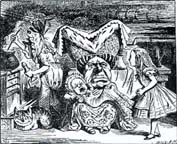 n Lewis Carroll's Alice in Wonderland, the character of the Duchess acts differently depending upon whether she's at home with her pig-child or away at the queen's party. Lewis Carroll portrays the Duchess as a rude and grumpy individual in her own home who doesn't seem to care very much for her baby. After Alice admits her ignorance of Cheshire Cats, the Duchess reveals her domestic nature:
n Lewis Carroll's Alice in Wonderland, the character of the Duchess acts differently depending upon whether she's at home with her pig-child or away at the queen's party. Lewis Carroll portrays the Duchess as a rude and grumpy individual in her own home who doesn't seem to care very much for her baby. After Alice admits her ignorance of Cheshire Cats, the Duchess reveals her domestic nature:
'You don't know much,' said the Duchess; 'and that's a fact.'
Alice did not at all like the tone of this remark, and thought it would be as well to introduce some other subject of conversation. While she was trying to fix on one, the cook took the cauldron of soup off the fire, and at once set to work throwing everything within her reach at the Duchess and the baby-the fire-irons came first; then followed a shower of sauce-pans, plates, and dishes. The Duchess took no notice of them even when they hit her; and the baby was howling so much already, that it was quite impossible to say whether the blows hurt it or not.
'Oh, please mind what you're doing!" cried Alice, jumping up and down in an agony of terror. 'Oh, there goes his precious nose!' as an unusually large saucepan flew close by it, and very nearly carried it off.
'If everybody minded their own business,' the Duchess said, in a hoarse growl, 'the world would go round a deal faster than it does.'

Oblivious to the happenings in her own house, the Duchess doesn't even notice when plates are whizzing past her nose. She shows no competence when it comes to hosting, since she speaks to Alice sharply and doesn't bother to introduce herself. After playing croquet with the Queen, however, the Duchess acts like a completely different character, starting when she greets Alice: "'You ca'n't think how glad I am to see you again, you dear old thing!' said the Duchess, as she tucked her arm affectionately into Alice's, and they walked off together." Carroll ridicules this immediate sisterhood formed after just one meeting in much the same way that Wilde mocks the instantaneous bond between Cecily and Gwendolyn in The Importance of Being Earnest.
Carroll uses the character of the Duchess to ridicule the double life that many Victorians led in the home and in public. The domestically unethical Duchess, who beats her child and feeds him pepper when he sneezes at home, obsesses over morals when in the company of others. Her views are entirely different depending on whether she's in the private or the public sphere. Carroll draws attention to this when the Duchess says, "'Oh, 'tis love, 'tis love, that makes the world go round!'" and Alice replies, "'Somebody said. . . that it's done by everybody minding their own business!'" The Duchess' attitude, ideologies, and character change depending on where and around what sort of people she finds herself.
Questions
1. Lewis Carroll led a double life. As his biography on the Victorian web says, "With the launch and immediately phenomenal success of Alice, the story of the author's life becomes effectively divided in two: the continuing story of Dodgson's real life and the evolving myth surrounding "Lewis Carroll." Carroll quickly became a rich and detailed alter ego." Compare what we know about Carroll/Dodgson's double life with the double identity of the Duchess. Why might Carroll seemingly ridicule the idea of having two different sides to oneself when he divided his life in two?
2. In Great Expectations, Dickens portrays the character of Wemmick as two different people depending on whether he's at home or at work. However, the Duchess' private and public identites represent the opposite of Wemmick's identities. In the domestic setting, the Duchess is rude and uncaring while Wemmick is friendly and loving. What does this reversal say about dual lives? How does it reflect a difference in gender roles?
3. Carroll often uses italics to add a certain tone both to his narration and to dialogue. For example, in the passage above, Alice says, "Oh, please mind what you're doing! . . . oh, there goes his precious nose!" How does this notation shape Alice's character for the reader? Why would Carroll choose those words to italicize?
4. After Alice draws attention to the Duchess' inconsistency in explaining what makes the world go round, The Duchess says, "It means much the same thing," referring to "love" and "everybody minding their own business." Is there any truth in this? How are these two ideas related?
Last modified 9 March 2009